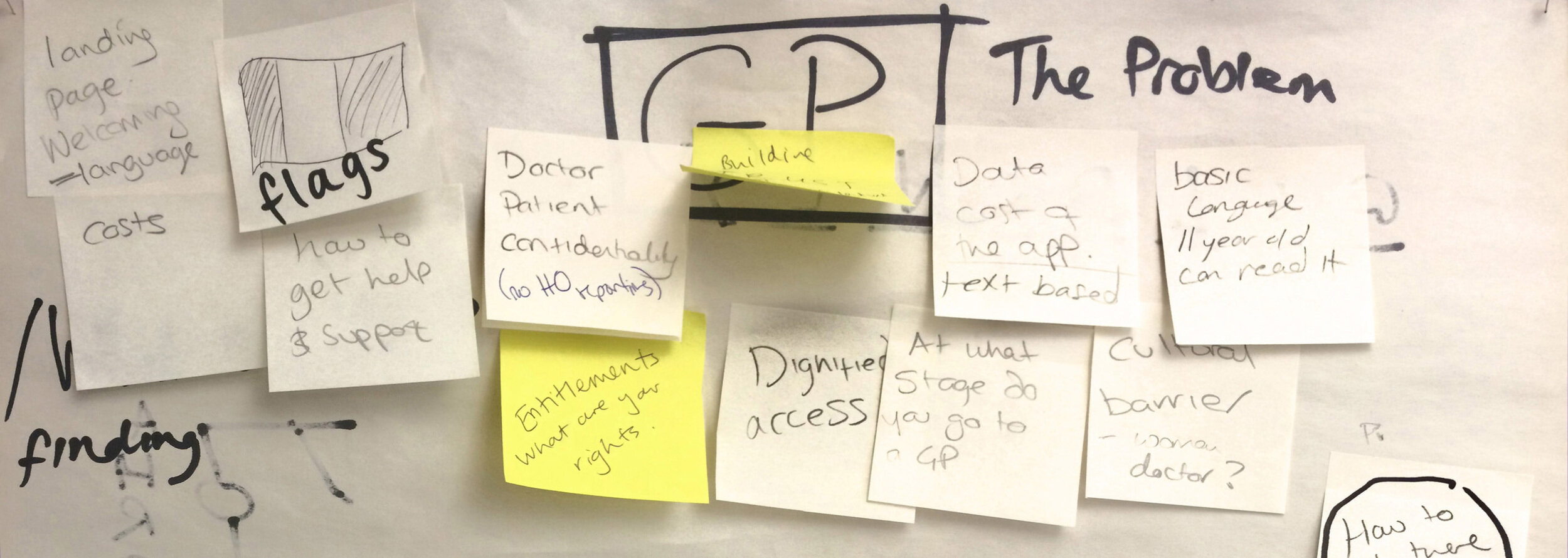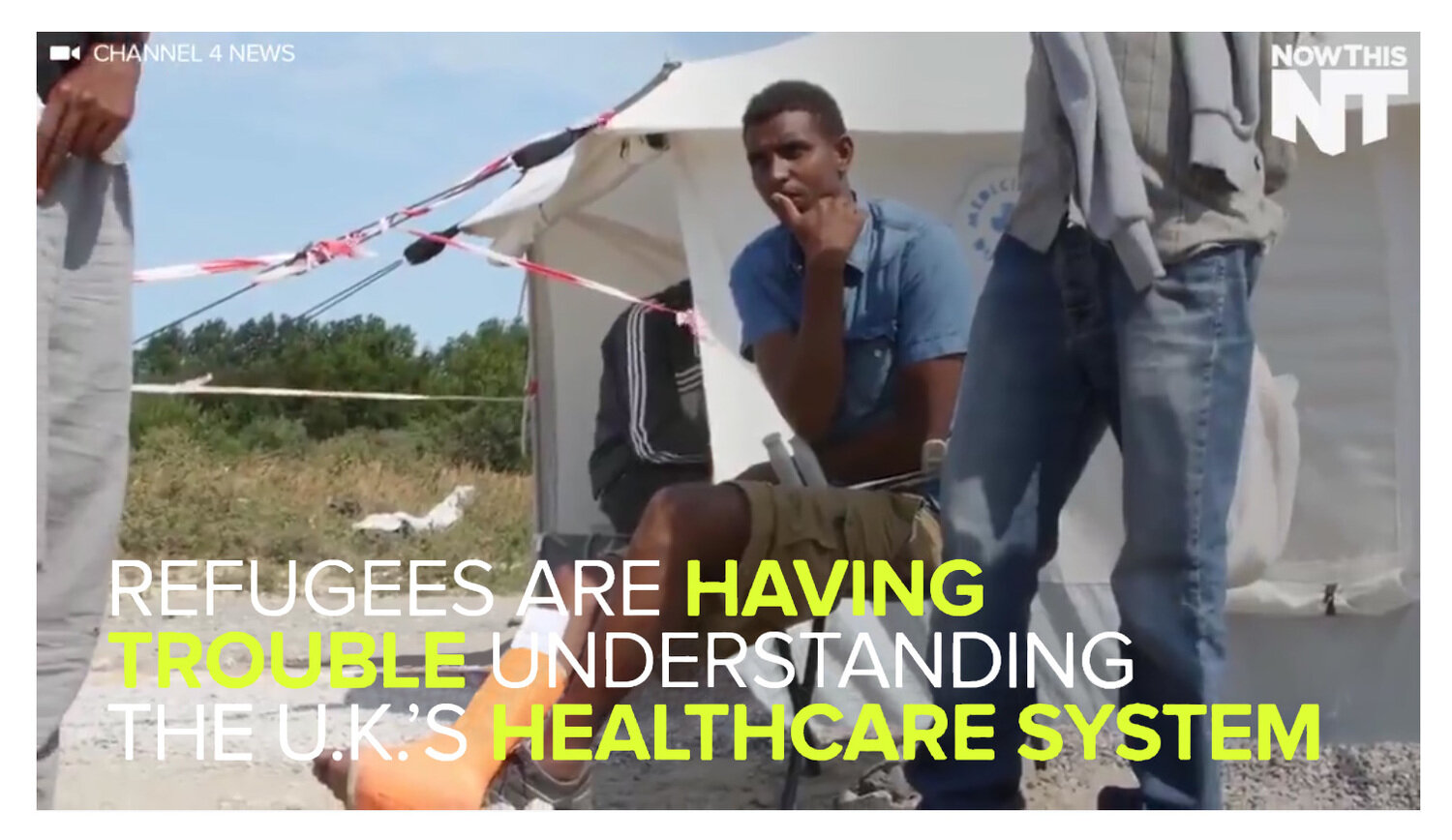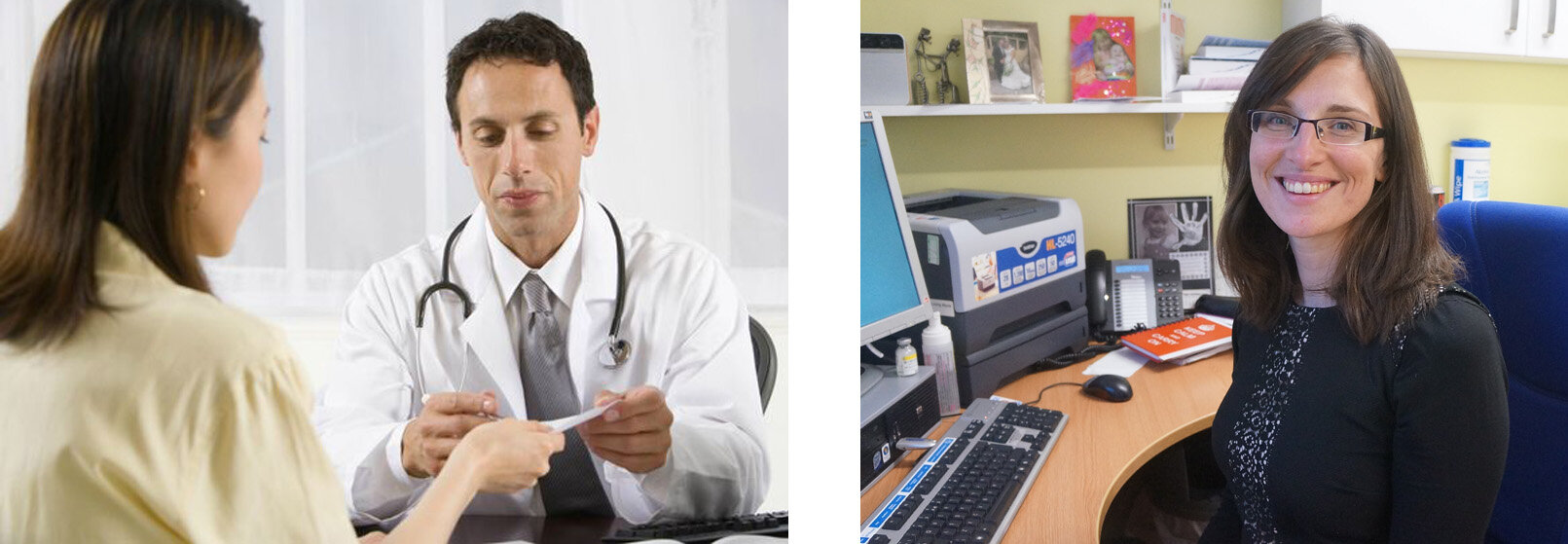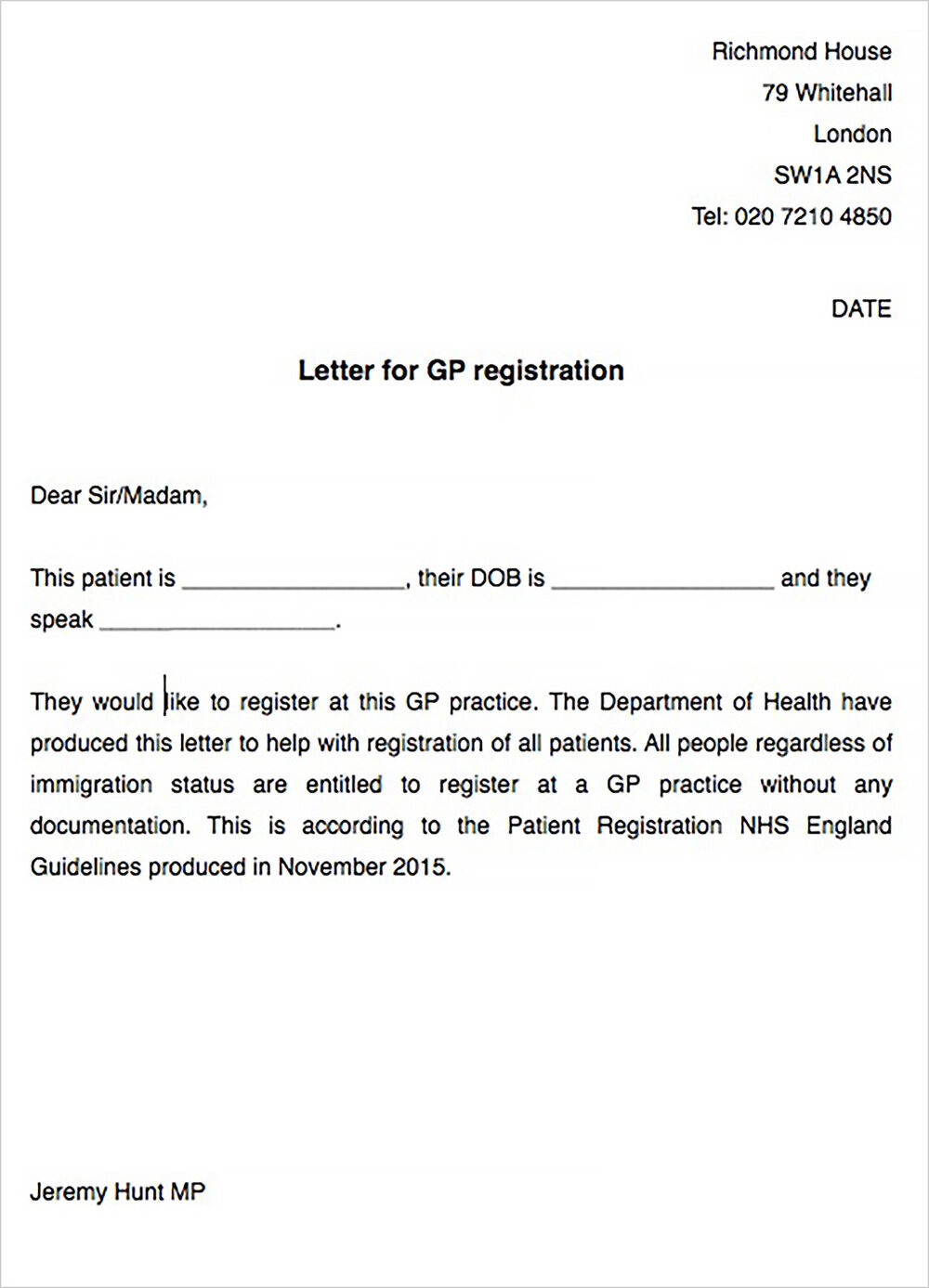
GP for me
Case study report
GP for me
Helping migrants navigate GP services
Group project, peer reviewed: On this project I worked within a team of twelve. Other group members were:Cassandra Baiano, Lorin Thwaits, Holly Royston-Ward, Sonal Sanghrajka, Aga Zdzenicka, Philip Bebbington, Cassie Baiana, Sophie North, Patric Macharon, Tanimola Martins, Aaniya Ahmed.
Duration: Two day 'NHS Navigation' Hackathon.
Tools and Methods Used: User Research, Agile Workflow, Design Studio, Paper Prototyping, Digital Prototype andUser Testing.
The Brief
Help migrants find their local GP and register with them.
The solution
A mobile app, which helps migrants to navigate their way round the NHS and GP registration process, in their native languages.
Project highlight - Creating a fully thought through solution that could have a significant and positive impact on a large number of migrants quality of life and overall health, whilst saving significant money for the NHS itself.
Watch Channel 4 News clip about U.K. 'Hackathon helps expand refugees' access to healthcare, posted by NowThis on Sunday, 13th march 2016, for Channel 4 News here
Case study
For most people in the UK, the knowledge that healthcare is available at the point of use, for all, is a right that we not only enjoy, but one that we take for granted and assume is universal. As patients of the NHS, we understand that we must register with a GP in our local area, and where to go, and who to see when we are ill.
The experience of people wishing to work within the UK, migrants and those seeking asylum, is often very different, and far from simple. The basic rights that we take for granted, are not so easy to understand. Registration with a GP seems complicated and the need to register within the NHS system before you are even ill can even be a complete mystery.
The Brief
The task of the NHS Navigation Hackathon was split into eight groups, covering different aspects of the NHS and GP services that migrants could come across, create solutions for each area: all of which could be developed into one App/website where users could gather information about different aspects of the NHS in one place.
Discovery phase
At the very start of the NHS Navigation Hackathon we were introduced to Iman Rafatmah, a UK citizen, who has navigated himself and his family through the gauntlet of the immigration system, talking us through some of the challenges that he and his family have come across, as people seeking asylum, whilst entering the country.
From this we leant many insights straight from a user's perspective, starting with the struggles of language barriers and not knowing what a GP was, or the NHS. Being asked to register with a GP, yet not being told what that meant can lead to unnecessary anxiety, at a time when stress from the situation people find themselves in can be a significant blocker to being able to register with the healthcare system.
The process of applying for immigration can take years, and in some cases decades. Once ‘leave to remain’ has been granted, in just one month, you can be, in-effect homeless, despite having been in the ‘system’ for many years. Imam’s story described how he was turned away from doctors for not having a passport or proof of having a permanent address. Asylum seekers are provided documentation at the point of entry to the UK, but do not often have a passport, and many illegal immigrants would not wish to share an address through fear of deportation.
Through the many talks from healthcare practitioners and those that have gone through the immigration and asylum process, we learnt some interesting insights as to why there are some challenges for people entering the country. To many, especially from the Middle-East, the idea of going to see a doctor is that they would always be located in a hospital, you would only see them when you are ill, and more often than not, wearing a lab coat and stethoscope.
The notion that you would need to register with a GP before you are ill, or that the doctors would be located in a house, and wearing casual clothes is a cultural barrier, which does not instil confidence to those of another culture.
GP service team
With these initial facts in mind I was able to join the General Practitioners group, joining eight healthcare professionals, led by Holly Royston Ward, from the Doctors of The World organisation and Sonal Lekhani, Innovation Lead, from Barclays. The team also consisted of two developers and another UX Designer.
Through rapid research we learnt that over £375 million, could be saved, by reducing unnecessary hospital admissions. We learnt that although the cost of an A&E submission is £244 per visit, it is significantly less at £36 per visit to a GP. This alone informed us that the need to register migrants onto the NHS was important not only for peoples’ quality of life, but also to save significant amounts of money, which is needed in the NHS, no matter what peoples' political stance is on immigration.
The Citizens Advice Bureau website (Shown above) indicates that some services are free at the point of use, but not all, and while this is the case, these complicated messages for foreign speakers do put off many migrants from registering due to the confusion caused.
The article on Sky News on 19th October 2014 by Emma Birchley, describes the worries migrants have about being deported, whilst registering, and where charities are stepping in to help those people, who are disconnected from the NHS. In the news clip, we learn that 20% of migrants are too scared to come forward and register with their local GP.
Richard, an Asylum Seeker, in 2003 stated:
“You get frightened, so what happens is you decide to hide away, and if you have any medical condition, any problem, you end up getting worse and worse, and maybe in the end you may even die because you do not have any help. ”
A report by think-tank ‘Demos’ in October 2014 found that “Failing to detect ill health early can ultimately result in increased treatment costs”. Furthermore the author Max Wind-Cowie states “There is also the fear that transmittable diseases are being passed on to the wider public by those too anxious to seek help”.
The Sky News article also quotes Dr Clare Shortall of Doctors of The World organisation who states: “Regardless of your position on immigration I think we are talking about vulnerable people who are victims of trafficking, children, domestic violence, pregnant women. We are talking about them not being able to access health care”.
Migration watch UK, a website following the impact of migration, clearly outlines the new legislation from November 2015, which clearly states that “Registration should not be withheld because the patient does not have proof of residence or personal identification”. The article continues with a scathing prediction of what this will do to numbers of people wishing to visit for ‘health tourism’, including from the USA who have a private health system, but its understanding of new legislation makes the facts very clear indeed.
As a team, the ‘GP group’ expanded upon the initial research, due to the huge wealth of knowledge we had from health care experts, within the team. With the input of both developers and UX Designers, we quickly narrowed down what the task at hand was for registering with a GP, and what the core user journey was. By doing so we were quickly able to define the problem and focus in on the solution, without being set back by ‘scope creep’, and over-complicating the app, making it too complex to translate into the many languages needed.
From early task analysis we realised that the landing page would have to not only be simple and cater for an array of languages due to the diverse mix of migrants points of origin, but that we must address cultural barriers from the landing screen, of the mobile app.
Our greatest challenge was to address the issue of trust within these communities, and to dispel myths that can easily accumulate when documents are not translated, or easy to access. For this reason we realised that we would need an ‘on-boarding’ whereby we introduced the GP and NHS to them, and described what it was actually all about.
Our greatest task was to address the customer journey of being able to register with a GP, the barriers to entry, or being turned away, and addressing the ‘fail scenario’, whereby they could still get turned away, despite legislation to the contrary and provide them with charities to contact, in this eventuality.
Design phase
We started the design phase by defining the user journey through our app, talking to the user as a member of their own community; explaining why they must register with a GP to access NHS services. The conversation introduces a GP, helps them find their local GP, and tells them what to expect when they go in.
With the experience from both charity and NHS professionals, the design was strongly influenced by how the user journey, in the eyes of a migrant, would be best approached. It was fundamental to our designs that anyone would feel as if the app was a member of their community talking to them.
Above is the user journey boiled down to its most core elements, which helped us focus on the user’s point of view, not that of the healthcare system looking outwards.
From the first screen designs we quickly learnt from users, that including a profile could be a barrier to registration by those disconnected from the healthcare system the most, due to fears of deportation.
The simple use of mapping tools, found across many other apps is simple to implement from the coding/development point of view, as much of this information is already included on the NHS Choices website.
With so much information available about GP surgeries online the challenge was not to overly complicate the app. The key is to get people through the door to register, after which further services could be explained.
The style of the pages above directly influenced the way data was shown on the final pages for the map, and information about the surgery, such as opening times.
Brand analysis
Through quick analysis of the current brand of the NHS, some simple colour schemes have clearly been implemented, through various shades of blue.
One of the NHS banner images directly influenced the landing page of the app, whereby people need to connect the app, with services in their own country, therefore a blurred image in the background of doctor in a lab coat, with a stethoscope was added to create a sense of trust between possible migrant workers and the service we are setting out before them.
One of the aspects that we considered was the way that we should communicate with the users of the app, in order to best relate to their place of origins and cultures. The need for familiarity to build trust with the users was essential.
In the interim we came up with placeholder characters that could represent any culture and simply fit the community member, and a GP, with difference in clothes colour and stethoscope. These avatars would need to be tested extensively with users of all the different origins of migrants for cultural nuances and also for detail of characters.
To enable a migrant throughout the registration process, the team of healthcare and charity professionals, developed the idea of a letter that a patient can present to the receptionist at a GP surgery. Should a migrant have issues being registered, by filling out a very simple form, a NHS letter-headed document would be produced and available in printable PDF, so that the person signing up to the GP would have extra weight behind them, and be confident that they would be accepted.
We considered the implications of not only the ‘happy route’ within the user journey, but also the unhappy route, by which the user fails to register with a GP, due to failed communication, or misinformation from frontline staff, who may not be aware of the new legislation from November 2015. For this reason the user would be provided with three charities to contact, based on the address/location that they entered into the search field.
Unlike the previous Hackathons that I have attended, our team was able to simultaneously create a clickable prototype using a combination of design in Sketch and Marvel digital clickable prototype, but also a live-coded prototype thanks to the two coders Larin Thwaits and Phillip Bebbington
Whilst presenting our contribution to the Hackathon, we were able to talk though the development of the App, with expert knowledge and input from the NHS and charity experts that really grounded and explained why every aspect of the app had been developed in the way that they were, especially when answering questions with the judges questions at the end of the presentation.

































